Ultimate Whey Isolate Protein Guide
Author:
Unlock your full potential by engaging with our experts and community! Have questions about your fitness journey or looking for expert advice on weightlifting techniques? Don’t hesitate — leave a comment below and Oleksandr Maksymenko will provide a personalized answer and insights to help you reach your goals.
Torokhtiy is reader-supported. Some links are affiliate links, and we may earn a commission at no extra cost to you. See our disclosure page for details.
Whey isolate protein is a favorite among fitness junkies and athletes, but what makes it so special? In simple terms, it’s a high-quality protein that does a great job at supporting recovery and muscle growth. It comes from milk but goes through extra processing to remove most fats and carbs so, in the end, you’re left with almost pure protein. It’s an excellent way to boost yout protein intake without the extra calories.
Why choose ti over other supplements and how do you find one that works? We’ll tell you all about it and more, so keep reading.
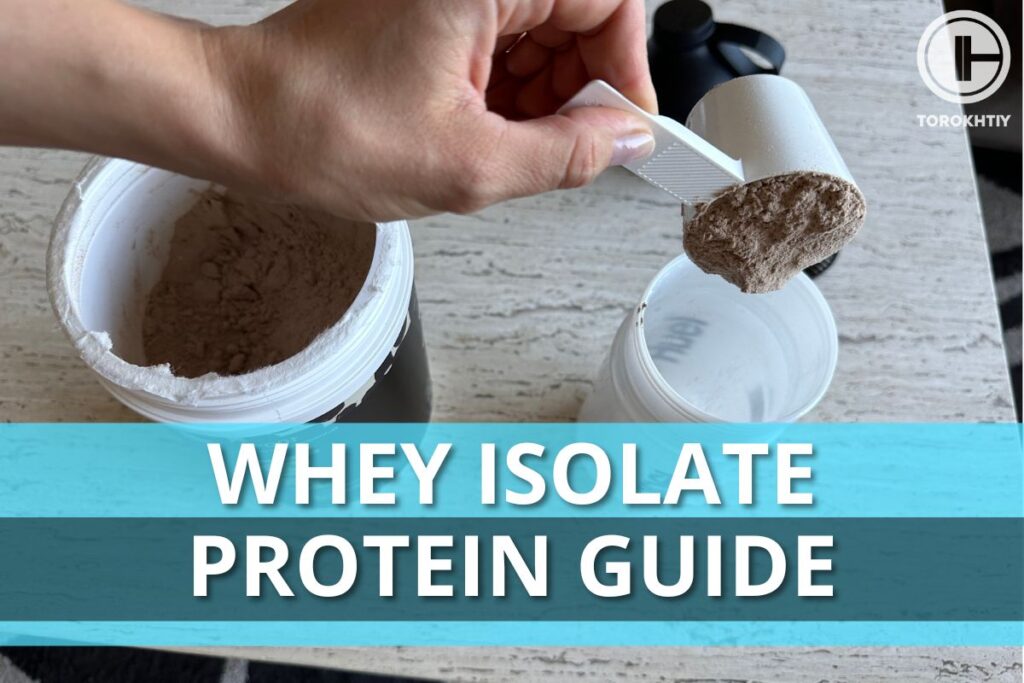
What Is Whey Isolate Protein Powder?
Whey isolate protein powder is a dietary supplement commonly used by athletes, bodybuilders, and fitness enthusiasts to support muscle growth, recovery, and overall health. It is derived from milk and is a byproduct of the cheese-making process.
The whey protein itself is a complete protein, meaning it contains all nine essential amino acids that the body needs but cannot produce on its own. It is quickly and easily digested, making it an ideal choice for post-workout nutrition when the body needs protein for muscle repair and recovery.
Whey protein isolate powder undergoes further processing to remove most of the fat, lactose, and other non-protein components found in whey protein concentrate.
This process results in a protein powder that is higher in protein content and lower in carbohydrates (predominantly lactose) and fats making it a suitable option for those who are lactose intolerant or looking to minimize their intake of these components.
The high protein content in whey isolate makes it an efficient source of amino acids, which are the building blocks of muscles. It is also rich in branched-chain amino acids (BCAAs), particularly leucine, which plays a crucial role in muscle protein synthesis.
Whey isolate protein powder can be easily mixed with water or other liquids to create a protein shake or added to smoothies, oatmeal, or baked goods to increase their protein content. It is widely available in various flavors and can be found in health food stores, supplement shops, and online retailers.
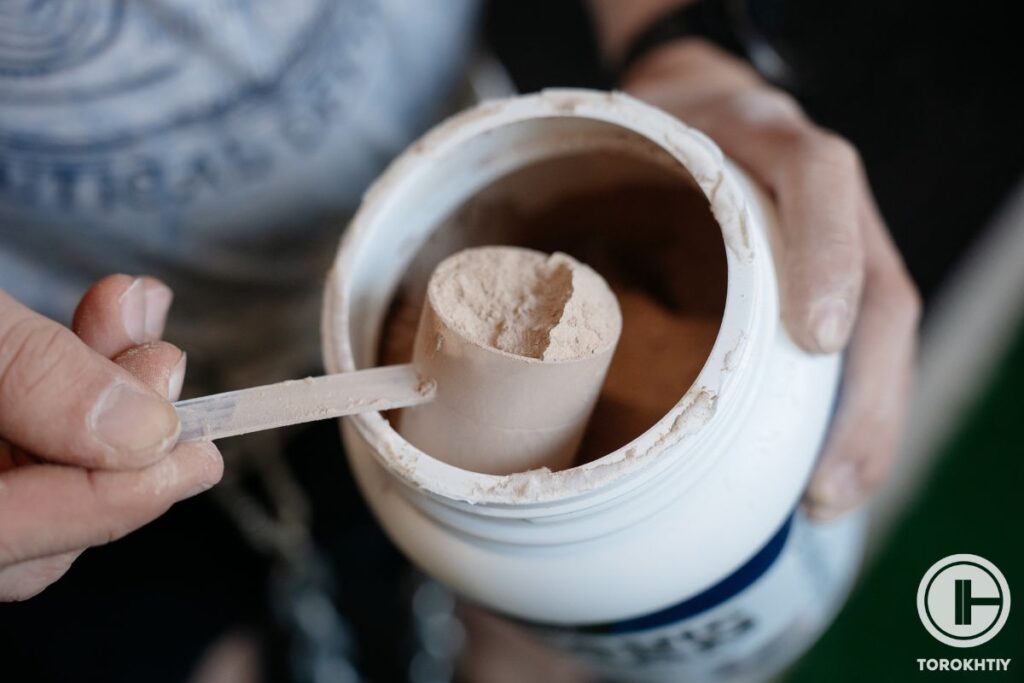
How Is Whey Isolate Protein Powder Different From Other Types of Whey Protein?
There are three main forms of protein powders: protein concentrates, protein isolates and protein hydrolysates.
Protein concentrate despite the name it’s the least concentrated form and may contain 20%–40% fat and carbohydrates. While this form of powder is a valuable product, it is worth considering the low protein to calorie ratio and often high lactose content.
Whey isolate protein powder differs from concentrate due to additional filtration that removes more fat and lactose. This process results in a higher protein content per serving, typically around 90 or higher, with fewer carbohydrates, fats, and lactose.
The higher protein concentration makes it appealing to fitness enthusiasts and athletes seeking to maximize protein intake while minimizing other macronutrients.
Furthermore, the reduced lactose content makes whey isolate a suitable choice for lactose-sensitive individuals. Keep in mind that for people who are highly lactose intolerant, even this may not be enough, in which case you should look for protein powders with the additional label of lactose free or zero carbs.
Protein hydrolysates are made by further heating proteins with an acid or enzymes, which dissolves the bonds holding amino acids together.
This can make the protein more digestible because shorter protein chains and individual amino acids are easier to digest, but in most cases it doesn’t provide significant benefits, but it does increase the cost of the powder.
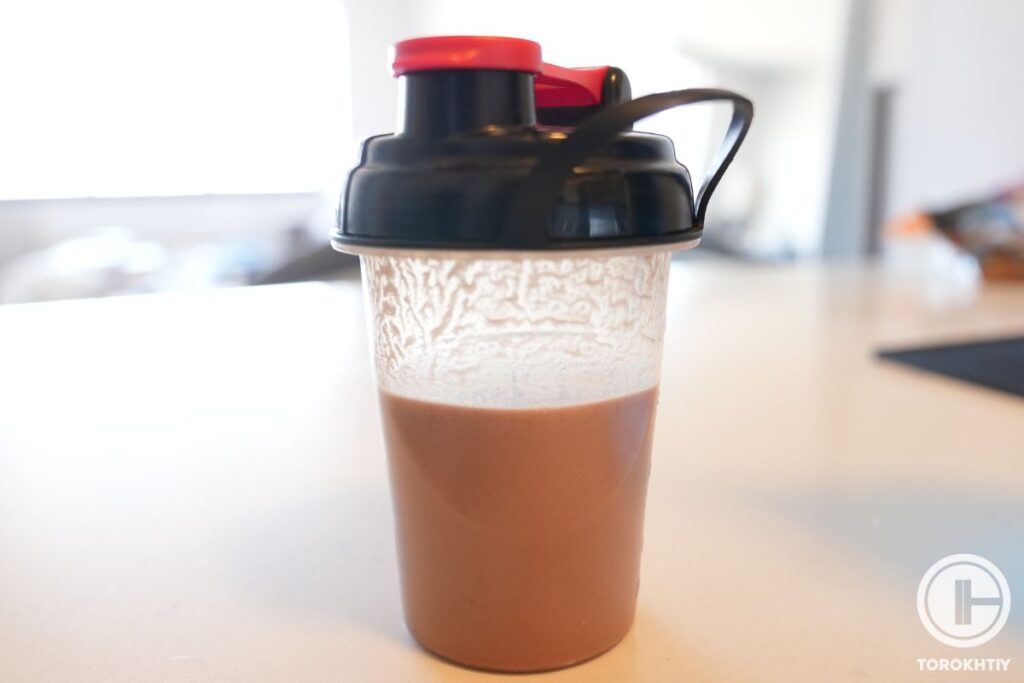
What Are the Benefits of Whey Isolate Protein Powder?
✅ High Protein Concentration
Whey protein isolate is known for its high protein content. It typically contains around 90-95% protein per serving, which is significantly higher than whey concentrate.
This high protein concentration makes whey isolate an effective supplement for individuals looking to increase their protein intake for muscle building, recovery, and overall protein supplementation.
Protein plays a vital role in the repair and development of muscle tissue. It is essential to consume an adequate amount of protein not only for individuals engaged in regular exercise, strength training, or athletic activities but also for the general population to maintain overall health.
✅ Fast Absorption
Whey isolate protein powder is rapidly absorbed by the body, thanks to its high bioavailability. Whey protein is considered a fast-digesting protein, which means it is broken down and absorbed quickly in the digestive system.
When whey isolate is consumed, it undergoes rapid digestion and absorption, leading to the swift delivery of amino acids to the muscles. Amino acids are the building blocks of protein and play a vital role in muscle protein synthesis, the process by which muscles repair and grow.
This fast absorption makes whey isolate an excellent protein source to consume around workouts or physical activity when the muscles need immediate nutrients for recovery and growth.
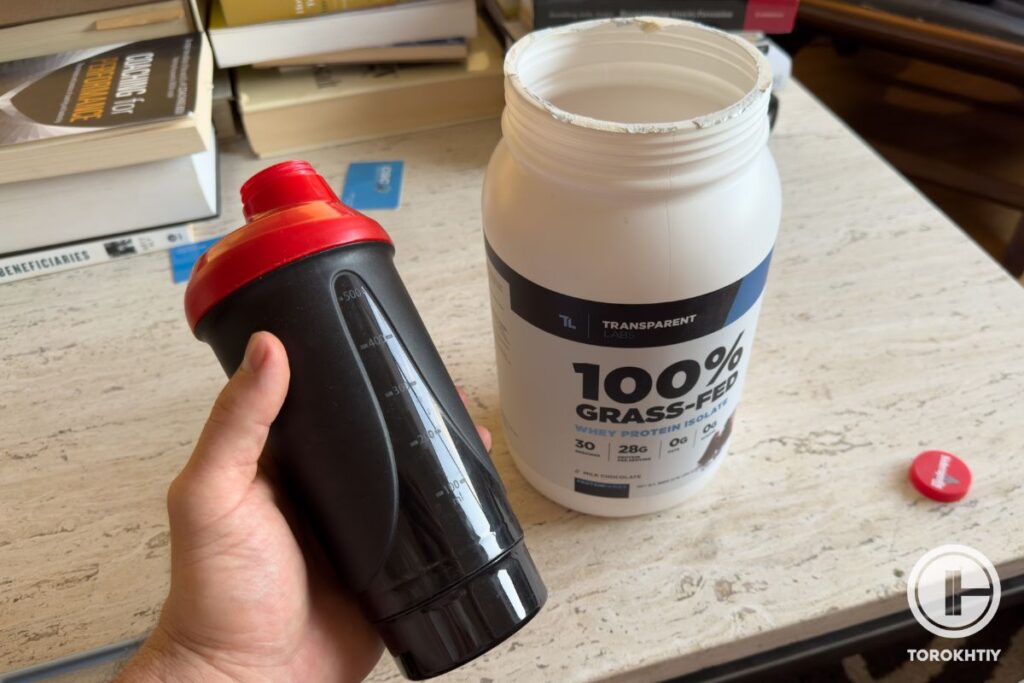
✅ Low in Lactose
Whey isolate protein powder is generally low in lactose, a naturally occurring sugar found in milk. During the production process, whey isolate undergoes additional filtration, which removes a significant portion of lactose. This makes it suitable for individuals who are lactose intolerant or have lactose sensitivity.
While it may not be completely lactose-free, the lactose content in whey isolate is usually minimal and well-tolerated by most people with mild lactose intolerance.
However, for individuals with severe lactose intolerance or those who prefer to avoid lactose altogether, there are lactose-free and zero-carbs whey isolate options available in the market.
✅ Minimal Fat and Carbohydrates
Whey isolate is processed to remove most of the fat and carbohydrates found in whey. This makes it an ideal choice for those following a low-fat or low-carbohydrate diet. The removal of fat and carbohydrates allows individuals to increase their protein intake without significantly impacting their overall macronutrient ratios.
Additionally, whey isolate is often lower in calories compared to other protein sources, making it a popular choice for individuals looking to manage their calorie intake while still meeting their protein requirements.

✅ Quick Way to Add More Protein to Your Diet
Whey isolate protein powder offers a convenient and efficient way to increase your protein intake. It can be challenging to consume enough protein solely through whole food sources, especially for individuals with busy lifestyles or dietary restrictions.
Whey isolate provides a concentrated source of high-quality protein that can be easily mixed with water, milk, or other beverages for a quick and convenient protein shake.
It allows individuals to supplement their diet with a significant amount of protein without the need for excessive food preparation or consumption of large quantities of food.
How Should I Take Whey Isolate Protein Powder for Best Results?
For optimal results, it is recommended to consume whey isolate protein powder shortly before or after exercise. At the same time, the key is to ensure adequate daily protein intake, the timing of protein intake is of much less importance.
Consume doses of protein from meals and protein shakes evenly throughout the day every 3-4 hrs, this will provide the best results.
Follow the recommended serving size provided by the manufacturer and consider consulting with a healthcare professional or a registered dietitian for personalized guidance.
How to Find the Best Whey Protein Isolate?
1. Look For Quality Sources
When considering iso whey protein powder options, choose whey isolate protein powder derived from reputable and quality sources to ensure its effectiveness.
In our review, we provide an in-depth analysis of quality brands and dissect the protein products to assess their diet suitability, protein source, cost, nutrition breakdown, and athlete endorsements. Our aim is to assist you in making the right choice to maximize the effectiveness of your fitness goals.
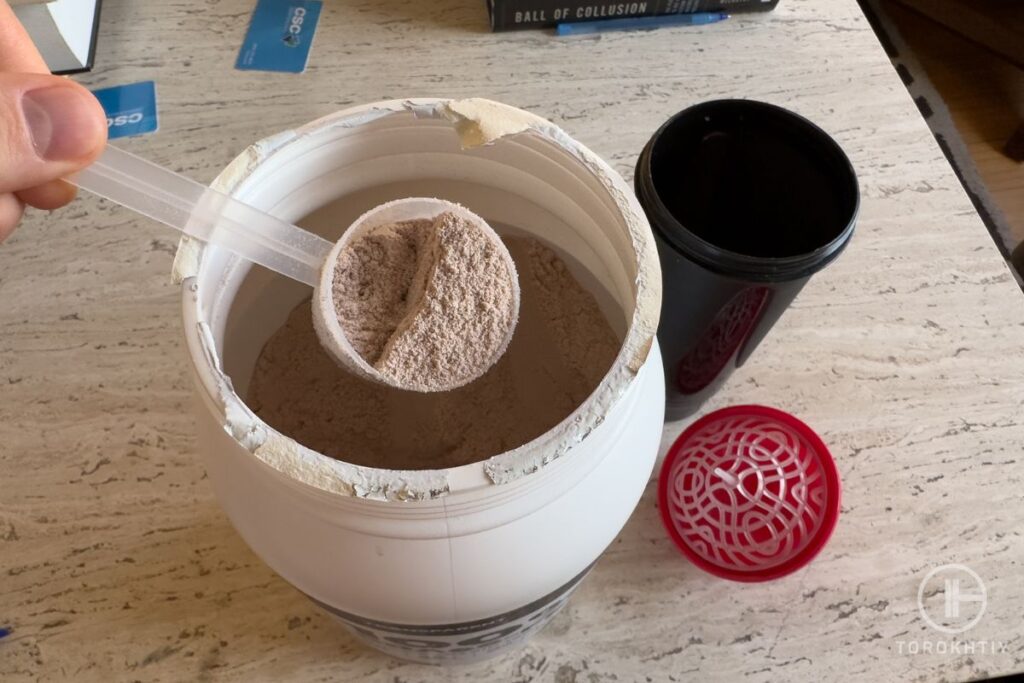
2. Check For Third-Party Testing
Look for products that have undergone third-party testing or carry certifications to ensure purity, quality, and absence of contaminants.Third-party testing involves independent laboratories analyzing the product to verify its composition and ensure it meets specific quality standards.
These tests can detect impurities, heavy metals, and other potentially harmful substances that may be present in inferior products. By choosing a whey isolate protein powder that has undergone third-party testing, you can have confidence in its safety and quality.
Certifications, such as Good Manufacturing Practices (GMP) or NSF Certified for Sport, are additional indicators of a product’s quality and reliability.
GMP certification ensures that the product is manufactured in a facility that follows strict quality control measures throughout the production process. NSF Certified for Sport goes a step further by specifically addressing the needs of athletes, guaranteeing that the product is free from banned substances.
3. Consider Additional Protein Types
Some whey isolate protein powders may contain additional protein types like whey protein hydrolysate, which may have different digestion rates and potential benefits.
It’s worth mentioning that there are other types of protein powders available apart from whey-based options. Some popular alternatives include plant-based proteins like pea, soy, rice, and hemp protein.
These plant-based protein powders offer different nutritional profiles and can be suitable for individuals following specific dietary preferences, such as vegetarian or vegan diets, or those with dairy allergies or intolerances.
After analyzing the alternatives, you’ll be able to make an informed decision in favor of one type of product or another.
4. Grass-Fed Protein
Grass-fed whey isolate protein powder derived from animals raised on grass-based diets is believed to potentially contain higher levels of omega-3 fatty acids, conjugated linoleic acid (CLA), and other micronutrients compared to protein powders sourced from grain-fed animals.
This is supported by the understanding that grass-fed animals have access to plants that are naturally rich in these nutrients, which can then be transferred to their milk. However, when you consider the low fat content of most proteins, most of the beneficial fatty acids are left out of the protein powder.
There are other potential benefits as well.
Cows raised on grass-fed diets may have a lower risk of antibiotic and hormone exposure, as they are less likely to require these treatments due to better overall health.
Grass-fed dairy farming practices are often more sustainable and environmentally friendly than conventional grain-fed farming methods. Grass-fed cows typically have access to pasture and are allowed to graze more naturally, contributing to improved animal welfare compared to cows raised in confined environments.
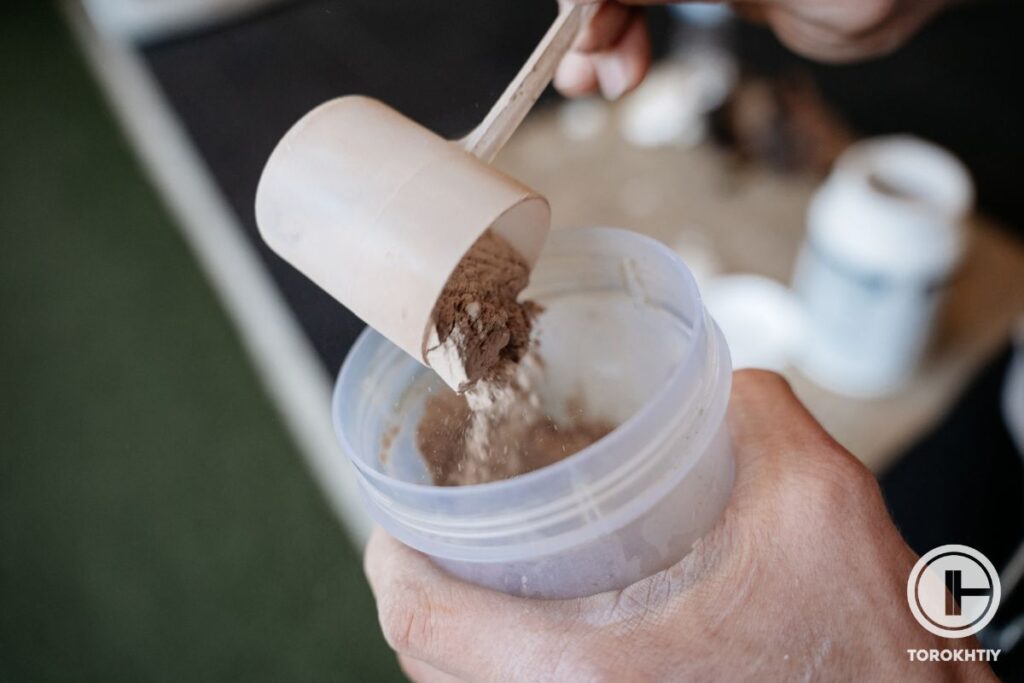
5. Consider Flavor and Mixability
Whey isolate protein powder is available in various flavors, so choose one that suits your taste preferences. Additionally, check whey isolate protein powder reviews or ask for recommendations regarding the mixability of the powder to ensure it easily dissolves in liquid without clumping.
6. Assess the Nutritional Profile
When comparing whey isolate protein powders, consider the protein content per serving, additional ingredients, and fortification with vitamins and minerals. Look for higher protein content to meet your needs. Check the ingredient list for flavorings, sweeteners, and additives.
Opt for powders with minimal additional ingredients if you prefer a natural approach. Some brands fortify their powders with vitamins and minerals, which can be beneficial based on your nutrient requirements.
Consider the macronutrient profile, including carbohydrates and fats. Assess the caloric content to align with your goals.
7. Consider Your Dietary Preferences or Restrictions
If you follow a specific diet, such as a keto or low carb diet, or have medical contraindications, such as lactose intolerance or an allergy to even small doses of soy that can get into the powder during manufacturing, check the ingredients list to ensure the whey isolate protein powder is suitable for your dietary needs.
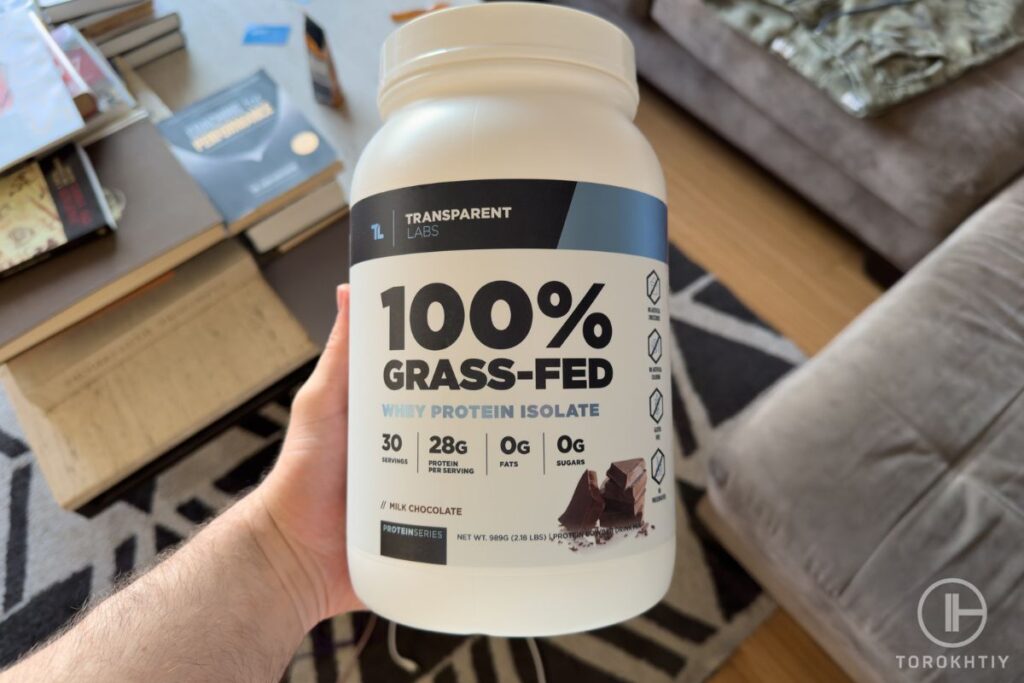
8. Evaluate Cost and Value
Whey isolate protein powders can vary in price, so consider your budget and the value you’re getting for the price. Compare the cost per serving and the overall quality of the product to make an informed decision.
9. Personal Experience and Reviews
Read customer reviews and testimonials to gather insights about the taste, effectiveness, and overall experience of using a particular whey isolate protein powder. Personal experiences can provide valuable information when making a purchasing decision.
Whey Protein Isolate by Transparent Labs
- Best For: Muscle Building, Recovery, Cutting
- Flavors: Chocolate peanut butter, Oatmeal chocolate сhip cookie, Milk chocolate, French vanilla, Peanut butter, Dark chocolate, Strawberry, Vanilla, Peanut butter, Mocha, Cinnamon French Toast, Unflavored
- Protein Source: Whey Protein Isolate
- Suitable for Vegans: No
- Package Information: 2.28 lb/30 servings, 4 lb/55 servings
- Protein-by-Weight Ratio: 81-87%
- Protein: 28 grams
- Carbohydrates: 0-3 grams
- Fat: 0-1 gram
- Calories per serving: 120
- Serving Size: ~33 g
- Price per serving: from ~$1.8Company Founded: 2015
- Recommended by: Hafþór Björnsson, Terron Beckham, Paul Sklar
Whey Protein Isolate by Transparent Labs boasts a protein-by-weight ratio of 81-87% (depends on flavor).
You also get a very low fat content, only 0.5g per serving, which is close to fat-free and 0-3 g of carbs depending on flavor. This protein powder’s suitability extends across diet types – whether you’re aiming to build muscle, recover swiftly, or trim down, it’s got you covered.
The brand also prides itself on one of the cleanest whey protein labels, with zero added sugars and no artificial sweeteners, food dyes, gluten, or preservatives.
It’s worth mentioning that the protein source is also of the highest quality. Grass-fed dairy comes from cows that have primarily been fed with grass and forage, as opposed to grains or processed feeds.
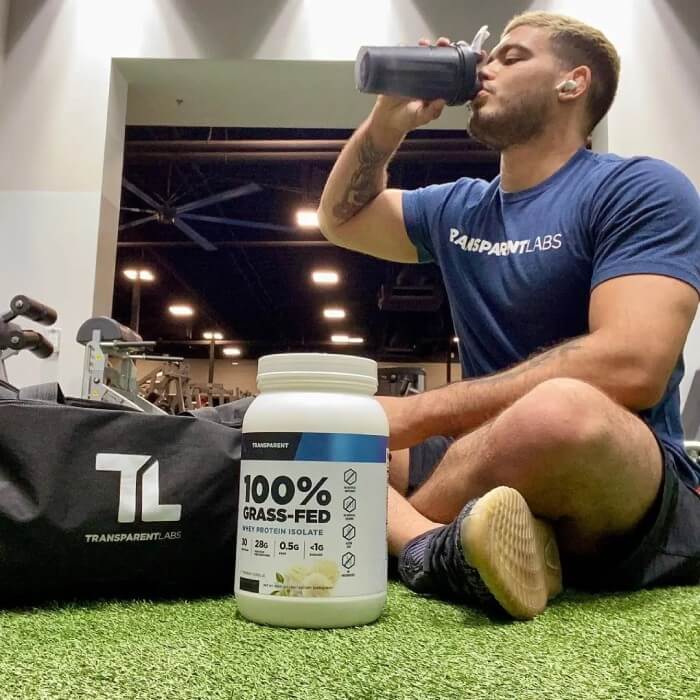
The only potential drawback is the price per serving for the smaller tub, which is more affordable for the larger package, offering better value for money.
FAQ
What Is Better, Whey Protein or Whey Isolate?
The choice depends on individual preferences and needs. Whey isolate has higher protein concentration and lower fat and lactose. Whey protein concentrate is a more cost-effective option.
Should Beginners Take Whey Protein or Isolate?
Both options are suitable for beginners. Whey protein concentrate is more budget-friendly, while whey isolate has higher protein content. Choose based on dietary needs and preferences.
Is Whey Protein Isolate Easier to Digest Than Whey Protein?
Yes, whey isolate is generally easier to digest due to lower lactose and fat content. However, individual tolerance may vary.
Should I Switch to Whey Isolate?
Consider switching to whey isolate if you want higher protein concentration and lower carbs, fat, and lactose. It may be beneficial for lactose intolerance or preference for a purer protein powder.
Conclusion
In conclusion, whey isolate protein powder is a highly beneficial dietary supplement, particularly for athletes, bodybuilders, and fitness enthusiasts seeking to support muscle growth, recovery, and overall health. Its high protein concentration, fast absorption, and low lactose content make it an excellent choice for various dietary preferences and fitness goals.
The best isolate protein powder on the market offers a perfect balance of high-quality protein, superior taste, and optimal purity for maximum muscle recovery and growth. Among the top-notch products available, we recommend Transparent Labs Whey Protein Isolate, which stands out for its exceptional quality, purity, and transparency in ingredients.
If you have any questions or would like to share your comments about whey isolate protein powder or any other health and fitness topics, feel free to leave them below. Your feedback and engagement are valuable, and we’re here to provide any further information you may need.
Also read:
- Protein Powder And Lactose Intolerance
- Best Protein Powder For Sensitive Stomach
- Best Heavy Metal Free Protein Powder
- Whey Protein vs Casein
- How To Make Protein Shakes Taste Better
References:
- Grass-fed cows produce healthier milk // UMN: https://extension.umn.edu/ pasture-based-dairy/grass-fed-cows-produce-healthier-milk
- Leucine content of dietary proteins is a determinant of postprandial skeletal muscle protein synthesis in adult rats // NIH: https://pubmed.ncbi.nlm.nih.gov /22818257/
- The role of glutamine in supporting gut health and neuropsychiatric factors // Sciencedirect: https://www.sciencedirect.com /science/article/pii/ S2213453021000112
- International Society of Sports Nutrition Position Stand: protein and exercise // NIH: https://pubmed.ncbi.nlm.nih.gov/ 28642676/
- Dietary Protein and Muscle Mass: Translating Science to Application and Health Benefit // NIH: https://www.ncbi.nlm.nih.gov/pmc /articles/PMC6566799/
- The effect of protein timing on muscle strength and hypertrophy: a meta-analysis // NIH: https://www.ncbi.nlm.nih.gov/pmc /articles/PMC3879660/
- International Society of Sports Nutrition Position Stand: protein and exercise // NIH: https://pubmed.ncbi.nlm.nih.gov/ 28642676/
- Photos are made by Torokhtiy Media Team.
Why Trust Us?
With over 20 years in Olympic weightlifting, strength training, nutrition coaching, and general fitness our team does its best to provide the audience with ultimate support and meet the needs and requirements of advanced athletes and professional lifters, as well as people who strive to open new opportunities and develop their physical capabilities with us.
By trusting the recommendations of our certified experts in coaching, nutrition, and sports training programming, as well as scientific consultants, and physiotherapists, we provide you with thorough, well-considered, and scientifically proven content. All the information given in the articles concerning workout programming, separate exercises, and athletic performance, in general, is based on verified data.
The product testing process is described in more detail here.
Author: Oleksandr Maksymenko
Certified Sports Nutritionist,
MSc Sports Dietetics
Specializing in: Weight management, Fitness / Sports nutrition
Oleksandr is a professional fitness nutritionist certified by the Fitness Professional Association (FPA). He follows the principles of evidence-based dietetics and fosters a healthy relationship with food in his clients, ensuring there are no strict prohibitions on their favorite foods or frequent lapses. His primary goal is not only to achieve results for you but also to sustain them over the long term, all while enjoying tasty and delicious food.



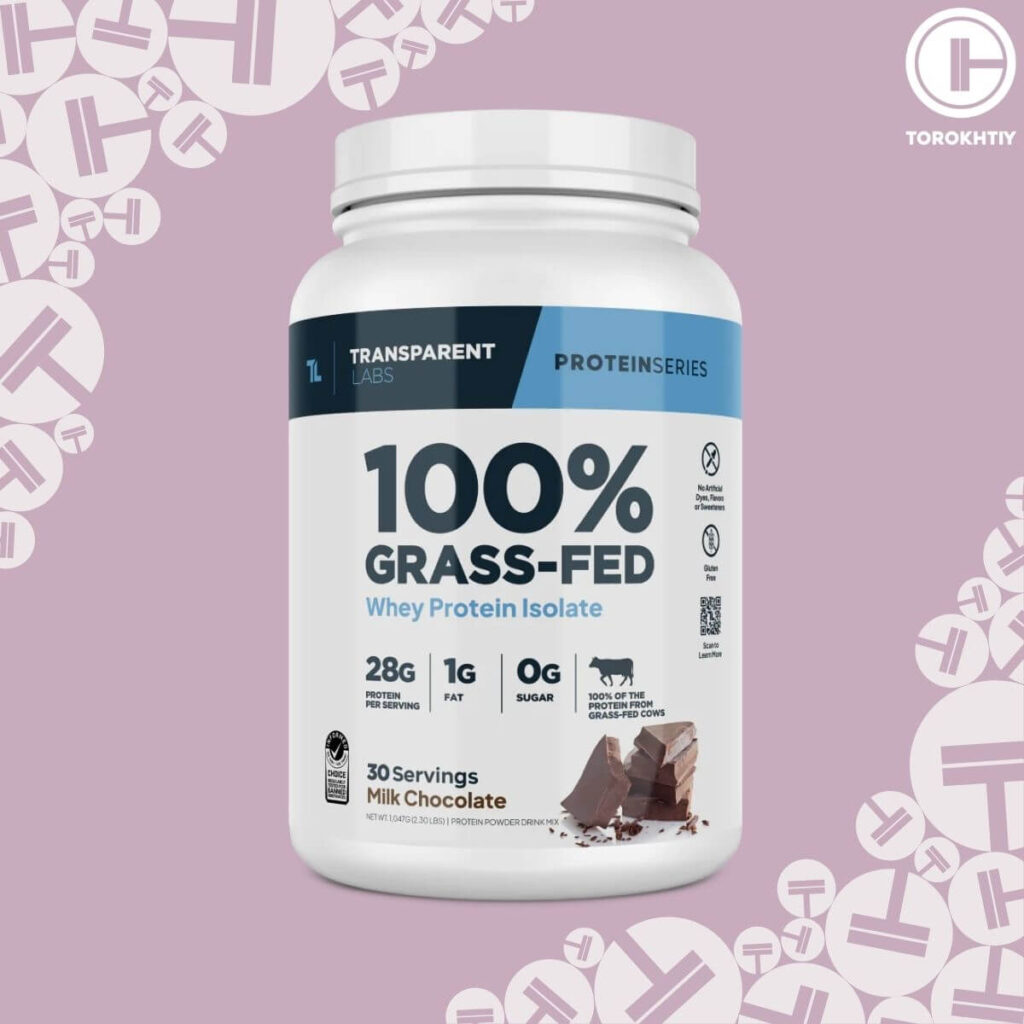
Still have questions after reading our article? Unlock your full potential by engaging with our experts and community! Don’t hesitate — leave a comment below and Oleksandr Maksymenko will provide a personalized answer and insights to help you reach your goals.